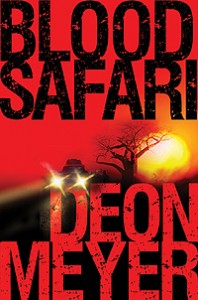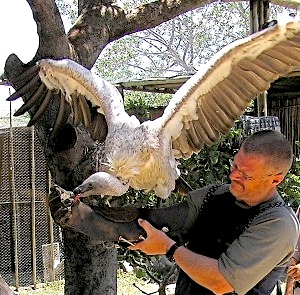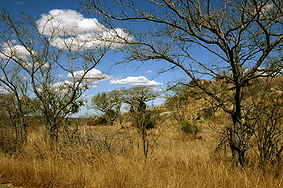“You don’t know what it’s like here. We have troubles. Big troubles…It’s like the veld in drought. Ready to burn. We beat out the fires. We run from one fire to the next fire and we beat out the flames…If we don’t stop it, the fire will burn so big and fast and far that everything will be burnt up. Everything and everyone.”

Deon Meyers just keeps getting better and better with each thriller. Setting his novels in contemporary South Africa, he raises the bar for thrillers by infusing each of his novels with national political tensions—historical, racial, and economic—emphasizing the urban and rural disparities which make the country so complex and so difficult to govern. His “heroes” have traditionally been far from “heroic” in the traditional sense, always people at odds with society, especially in the case of Lemmer, main character (and hired bodyguard) in Blood Safari, a man who has allowed his passions to dominate him to the extent that he served time for his assault on four men and gained pleasure from the mayhem—“I felt at one with the world, whole and complete, good and right. It’s a terrible thing. It intoxicates. It’s addictive. And so terribly sweet.”

Lemmer, working for Body Armor, the premier bodyguard service in the country, has been hired to guard Emma le Roux, a wealthy young woman who, after seeing a news story on TV, believes that her brother Jacobus le Roux, thought dead for twenty years, is, in fact, alive—and a suspect, under an assumed name, in a mass murder in Kruger National Park. Emma herself has recently been targeted by unknown assassins and has barely escaped from her house after a violent attempt on her life. She has no idea whether her suspicions about her brother are correct, nor does she have any idea what motive might inspire evil-doers to attack her so viciously.
Her brother Jacobus, four years older, was always interested in conservation, especially the conservation of the animal life in South Africa, and he worked at Kruger Park, where he disappeared twenty years ago. The suspect in the recent Kruger Park murders, calling himself Jacobus de Villiers, has also worked at the Moholololo Rehabilitation Center, which nurses ill and wounded vultures, and at a private reserve, run by a multimillionaire, which tries to keep large areas of the veld free of development as a natural animal habitat.
 As Lemmer and his client, Emma le Roux, try to find out if the Jacobus de Villiers whom she saw on TV is, in fact, her brother, they are exposed to the life-or-death infighting among the various conservation groups, the sometimes mysterious relationships between conservation police and local law enforcement, and the relationships and conflicts of these groups with developers and local tribes who want a piece of the tourist game-park action. Violence is a way of life for these people, and Lemmer is often in the crosshairs of his and Emma’s unknown enemies.
As Lemmer and his client, Emma le Roux, try to find out if the Jacobus de Villiers whom she saw on TV is, in fact, her brother, they are exposed to the life-or-death infighting among the various conservation groups, the sometimes mysterious relationships between conservation police and local law enforcement, and the relationships and conflicts of these groups with developers and local tribes who want a piece of the tourist game-park action. Violence is a way of life for these people, and Lemmer is often in the crosshairs of his and Emma’s unknown enemies.
Meyer is careful to include all the players in the game here, presenting all facets of the big picture regarding the wildlife bounty of the country—conservation vs. the lures of development; commitment to a lawful country under unified rule vs. the every-man-for-himself attitudes which undermine the country; and open and honest dealings between enforcement agencies and private interests vs. payoffs and blackmail. No one knows whom to trust, if anyone, and no one knows what secret arrangements any of the players may have made with sleazy operators who exist outside the mainstream. As the characters develop more fully, and as the author reveals more and more information about their backgrounds, the reader’s stake in the outcome becomes more and more powerful. The action comes fast and furious, and the suspense builds.
Meyer creates vibrant sce nes, describing the environment, the local settings, the animals, and the racial interactions of South Africa’s citizens in vivid detail. The people who oppose Lemmer’s investigation are understandably reluctant to go along with him, and their points of view are broad and not tritely black or white. Irony abounds, and the political and social repercussions of the resolution become understandable even if they do not always draw the reader’s sympathy. This is a terrific and unusual thriller, the fifth of Meyer’s novels, all of which are written in Afrikaans and translated, and each of which has been better than the last.
nes, describing the environment, the local settings, the animals, and the racial interactions of South Africa’s citizens in vivid detail. The people who oppose Lemmer’s investigation are understandably reluctant to go along with him, and their points of view are broad and not tritely black or white. Irony abounds, and the political and social repercussions of the resolution become understandable even if they do not always draw the reader’s sympathy. This is a terrific and unusual thriller, the fifth of Meyer’s novels, all of which are written in Afrikaans and translated, and each of which has been better than the last.
Notes: Also reviewed here: Meyer’s THIRTEEN HOURS (2009) TRACKERS (2010) COBRA (2014)
The author’s photo appears on his website: http://www.deonmeyer.com
At the Moholoholo Rehabilitation Centre, the author tries to hold on to food which a vulture is wresting from his gloved hand. Though they may be the ugliest birds in the world, vultures are essential to strip carcasses clean on wild life reservations, preventing disease and contamination. http://www.deonmeyer.com
Kruger National Park is one of the largest game reserves in Africa, stretching two hundred miles from north to south and 40 miles from east to west. The landscape is seen here: http://en.wikipedia.org
